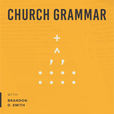
Summary: <br> This episode is a conversation with Dr. Steven Duby of Phoenix Seminary. We discuss "classical theism" as an aid for reading Scripture and doing Christology (3:12), boundaries the doctrine of God provides for the doctrine of the incarnation (19:12), the best case for the covenant of redemption/pactum salutis (32:09), engaging other scholars with clarity and humility (41:15), and more. <a rel="noreferrer noopener" href="https://www.amazon.com/Steven-J-Duby/e/B08478HG9T/?tag=bdsmith-20" target="_blank">Buy Steve's books</a>.<br> <br> <br> <br> GIVEAWAY: Go to <a rel="noreferrer noopener" href="http://www.ps.edu/churchgrammar" target="_blank">ps.edu/churchgrammar</a> to enter to win one of five (5) free copies and to read a free excerpt of Steve's new book, <a rel="noreferrer noopener" href="http://ps.edu/jesus-and-the-god-of-classical-theism/" target="_blank">Jesus and the God of Classical Theism</a>.<br> <br> <br> <br> Church Grammar is presented by the <a rel="noreferrer noopener" href="http://www.csbible.com/" target="_blank">Christian Standard Bible</a>. Intro music: Purple Dinosaur by <a rel="noreferrer noopener" href="http://www.nobigdyl.com/" target="_blank">nobigdyl.</a> Producer: Katie Larson.<br> <br> <br> <br> Brandon D. Smith is Assistant Professor of Theology & New Testament at <a href="https://www.cedarville.edu/Academic-Schools-and-Departments/Biblical-and-Theological-Studies/Faculty-Staff/Smith-Brandon.aspx">Cedarville University</a>, on the board of directors for the <a href="http://www.centerforbaptistrenewal.com">Center for Baptist Renewal</a>, and <a href="https://www.amazon.com/Brandon-D-Smith/e/B00L1VCU46/?tag=bdsmith-20">writes things</a>. You can follow him <a rel="noreferrer noopener" href="https://www.twitter.com/brandon_d_smith" target="_blank">on Twitter</a> at @brandon_d_smith.<br> <br> <br> <br> *** This podcast is designed to discuss all sorts of topics from various points of view. Therefore, guests’ views do not always reflect the views of the host, his church, or his institution.<br> <br> <br> <br> <br>
